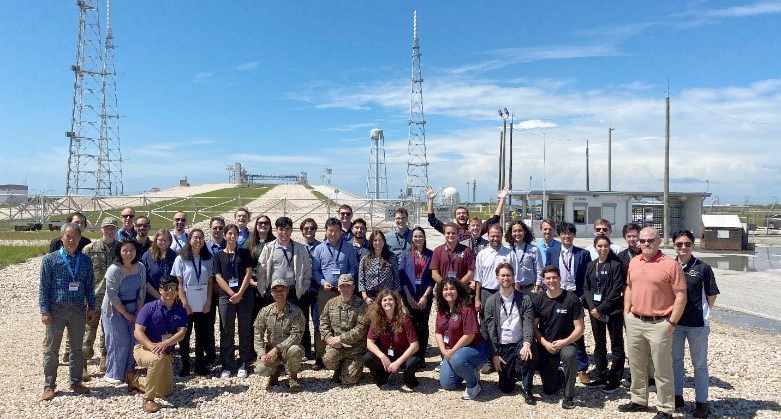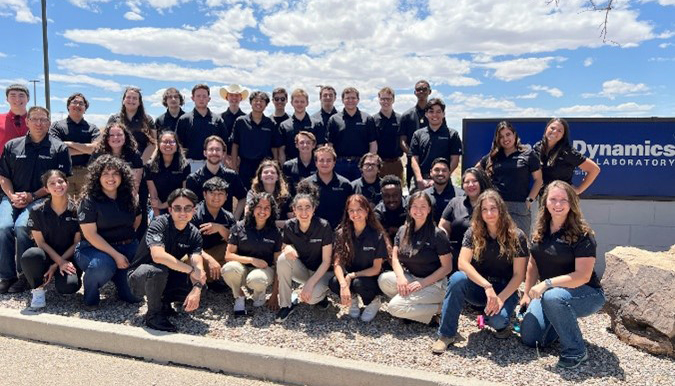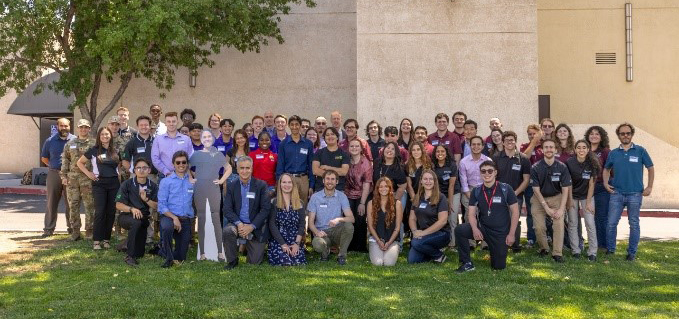AFRL, NASA propel universities forward as 2nd year of Mission Concept Program takes off
KIRTLAND AIR FORCE BASE, N.M. (AFRL) — The Air Force Research Laboratory, or AFRL, and NASA are collaborating with eight American universities for the second year of the Mission Concept Program, which runs May 13 to July 19, 2024. In its first year, the program assisted eight universities from across the U.S. in gaining skills focused on early satellite mission design through mentorship and guidance from space professionals.

Air Force Research Laboratory staff stand with university students and their professors from a variety of academic institutions across the nation in front of Launch Complex 39A at NASA’s Kennedy Space Center in Merrit Island, Florida in May 2023. AFRL and NASA announced their collaboration with eight universities for a new Mission Concept Program that ran from May 15 to July 28, 2023. The program, sponsored by AFRL’s Space Vehicles Directorate, was held under the University Nanosatellite Program, which started in 1999 and has collaborated with 53 universities since its inception. (Courtesy photo)
The program, sponsored by AFRL’s Space Vehicles Directorate and which falls under the University Nanosatellite Program, or UNP, began in 1999 and has collaborated with 53 universities and 8,000 students since its inception. It will partner once again with NASA’s CubeSat Launch Initiative, or CSLI, through the Mission Concept Program to alleviate the typically high knowledge and capability barriers to entry for universities trying to participate in NASA and AFRL missions. This collaboration will also prepare the participants for the next UNP nanosatellite cycle in 2025 and future CSLI cycles.
Under UNP, the selected universities will work in collaboration with AFRL and NASA to develop nanosatellites, small satellites typically weighing less than 24 kilograms. Students and professors will have the opportunity to gain practical experience in various aspects of satellite development, including systems engineering, mission design, feasibility analyses and satellite design. AFRL will provide access to state-of-the-art facilities, resources, expertise and mentoring as program participants develop small satellite mission areas, including earth observation, communications and technology demonstration. Three students from each of the selected universities will have the opportunity to gain practical skills during a nearly two-month-long intensive training session at Kirtland Air Force Base, New Mexico.

University student participants pose for a group photo after completing a Space Dynamics Laboratory internship experience as part of the new Mission Concept Program in July 2023 in Albuquerque, NM. AFRL and NASA first announced their collaboration with eight universities for the Mission Concept Program in 2023. The program, sponsored by AFRL’s Space Vehicles Directorate, was held under the University Nanosatellite Program, which started in 1999 and has collaborated with 53 universities since its inception. (Courtesy photo)
“The Mission Concept Program once again will include a diverse range of students from the new participating universities who will have the opportunity to work on real-world satellite projects [and] gain valuable and high-demand skills in the aerospace and space industries,” said Emi Colman, deputy program manager of the UNP. “The program has proven, in only one year, to help universities enter the field of small satellites by promoting interdisciplinary collaboration, sparking innovation and inspiring the next generation of aerospace leaders.”
Educational programs such as this can make a significant impact on students, professors and universities. Coming out of its first year of the Mission Concept Program, participant Tarleton State University added an Aerospace minor to its curriculum and created a specialized laboratory at the Mayfield College of Engineering designed to facilitate small satellite research and projects.
Dean Rafael Landaeta, a first-year participant, tasked Tarleton with establishing a TexanSat student club.
“We are actively advancing in the creation of a specialized laboratory designed to facilitate small-satellite research and projects,” said Dr. Jun Xu, professional engineer, associate dean and associate professor at Mayfield College of Engineering, Tarleton State University. “This marks an exhilarating milestone in our journey, and we eagerly anticipate the opportunity to update on our advancements and forthcoming collaborations. The experience has been incredibly enriching for both our students and faculty advisers, thanks to the meticulously planned workshops and the invaluable mentoring provided by the Mission Concept Program.”

Leadership and staff with the Air Force Research Laboratory, NASA and college students pose for a group photo at the final event of the inaugural Mission Concept Program, Sheraton Uptown, Albuquerque, NM, in July 2023. AFRL, and NASA announced their collaboration with eight universities for a new Mission Concept Program that ran from May 15 to July 28, 2023. The program, sponsored by AFRL’s Space Vehicles Directorate, was held under the University Nanosatellite Program, which started in 1999 and has collaborated with 53 universities since its inception. (Courtesy photo by Tarlton University Multimedia Department)
Sean Gunther, a Tarleton State University student and first-year Mission Concept Program participant, said that he expects the potential impacts of this year’s program to be even more expansive than originally anticipated.
“We thought this was only going to be a set of workshops to get us ready for the satellite development process,” Gunther said. “Now, the path forward has been illuminated in such a way that our fledgling aerospace program is now completely restructuring the College of Engineering.”
Jesse Olson started as a student in the UNP, and later served as manager of the program for five years before moving on as the chief engineer of a larger, more complex mission within the AFRL.
“I can attest firsthand that UNP influences future generations of scientists and engineers for exciting, successful careers in the aerospace industry,” Olson said. “I participated on a UNP team as a student at Michigan Tech from 2013-2018, which directly led me to where I am today.”
Similarly, Colman, now an integral part of the Mission Concept Program as the deputy program manager and UNP lead, also attested to the success of the program.
“I participated in UNP as a student at Michigan Technological University during NS-10,” said Colman.
The following universities will participate in the UNP’s 2024 Mission Concept Program:
- Florida Atlantic University
- Northeastern University
- Tarleton State University
- University of Central Florida
- University of Mississippi
- University of North Dakota
- Valparaiso University
- West Virginia University
The University of Central Florida, Florida Atlantic University and Tarleton State University are minority and Hispanic-serving institutions. This year, six of the universities are new to UNP, in addition to the University of Central Florida and Tarleton State University. Four are new to NASA’s CubeSat Launch Initiative. Each proposal was chosen for its educational impact, university impact, minority outreach and Department of Defense and NASA relevance.
CSLI and UNP have interacted in the past, but the Mission Concept Program has been a beneficial direct collaboration and partnership, said Lee Jasper of AFRL’s Space Vehicles Directorate.
“NASA’s CubeSat Launch Initiative is proud to partner with AFRL, and we are excited to start year two with the University Nanosatellite Program on the Mission Concept Program,” said Norman Phelps, NASA Launch Services Program mission manager, CubeSat Launch Initiative. “The skills the students gained last year will help facilitate their participation in future UNP and CSLI cycles, increasing the breadth and depth of our perspective programs by empowering participants to think bigger, and introducing them to the skills, principles and know-how necessary to build a cube satellite or small satellite.”
In short, the program helps to expand the horizons of the students and professors, as they have a chance to take part in activities and materials they have never experienced before, Phelps said.
“We are excited to work with AFRL and UNP again in this effort, leaning into our corporate expertise in this field as we share lessons learned and put our participants through the rigor of a summer course focused on satellite development,” Phelps added. “We enjoyed working with each of the teams last year and hope to work with them for many years to come, either as future CSLI or UNP participants.”
The Mission Concept Program represents a significant milestone in advancing underrepresented universities and will provide hands-on experience in systems engineering, mission design, feasibility analyses and satellite design. As students and professors take part and complete the program, they will be expected to pass along the knowledge to their individual teams and help each university again develop a sustainable program capable of future space missions and nanosat projects. The UNP will then continue to provide a unique platform for collaboration between academia, industry, government and other DOD partners.
For more information on the UNP and the Mission Concept Program, visit: University Nanosatellite Program and Mission Concept Program Workshops (universitynanosat.org).
About AFRL
The Air Force Research Laboratory is the primary scientific research and development center for the Department of the Air Force. AFRL plays an integral role in leading the discovery, development, and integration of affordable warfighting technologies for our air, space and cyberspace force. With a workforce of more than 12,500 across nine technology areas and 40 other operations across the globe, AFRL provides a diverse portfolio of science and technology ranging from fundamental to advanced research and technology development. For more information, visit: www.afresearchlab.com.
